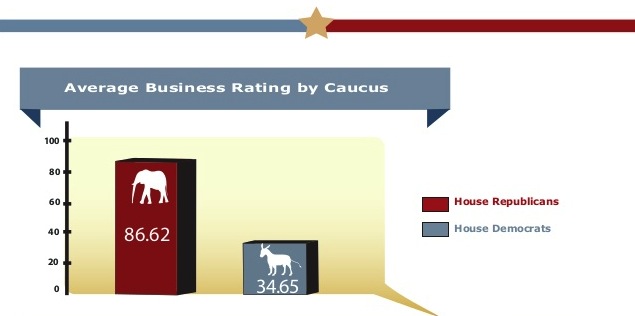Image via the North Carolina FreeEnterprise Foundation report
Buncombe County Rep. Tim Moffitt has been ranked the second most business friendly legislator in the state by the North Carolina FreeEnterprise Foundation.
The business group decided the legislator ratings by analyzing a variety of votes on issues related to taxation, government regulation, civil liability and private property rights. It also took into account “how accessible they were for information sharing and discussion,” as determined by “a confidential survey among more than 400 business leaders and government affairs professionals representing a multitude of business interests across North Carolina,” according to its Oct. 2 report.
Moffitt, a Republican, is currently serving out his second term in the Statehouse, representing District 116, which encompasses much of western Buncombe County. He was awarded a rating of 95.65, just short of Harnett County Rep. David Lewis, who was ranked number one with a rating of 96.34.
The North Carolina FreeEnterprise Foundation describes itself as a “nonprofit organization that provides innovative educational programs, non-partisan political research, and objective analysis to foster informed civic involvement, develop, an understanding of the free enterprise economy, and strengthen North Carolina’s prosperous business environment.” The group receives much of its funding from the conservative Pope Foundation, according to WRAL.
The foundation ranked Buncombe County Republican Rep. Nathan Ramsey 28th in the state, with a score of 88.52. He represents District 115, which includes Fairview, Black Mountain and Weaverville.
Buncombe County Democratic Rep. Susan Fisher is near the bottom of the group’s list, ranked 117 out of the Statehouse’s 120 legislators. She represents District 116, which encompasses the city of Asheville.
In addition, Republican Sen. Tom Apodoca of Hendersonville was ranked the second most business friendly member of the N.C. Senate (he earned a score of 90.3). And Democratic Sen. Martin Nesbitt of Asheville was ranked 43 out of a total of 50 N.C. senators, earning a score of 36.33.
The report notes that with Republicans securing super-majority control in both chambers of the N.C. General Assembly, “expectations were high at the start of the 2013 Session for a very positive legislative environment from a free enterprise point of view.”
However, it concludes: “The fractious relationship that emerged between the state Senate leadership and Gov. McCrory, and between House and Senate leadership, cast a long shadow over issues discussed and debated during the 2013 Session. … While the legislature did tackle many substantive issues important to promoting and sustaining a positive business climate in the state, such tensions hampered consideration of a fuller complement of business-oriented proposals.”




Headlining an in-house award from Art Pope to one of his toadies. Perhaps the Xpress can start carrying the WorldNet Daily feed as well. Way to go guys!
“Conservative” Pope vs. “???” ACLU:
“The group receives much of its funding from the conservative Pope Foundation”
“The American Civil Liberties Union of North Carolina released its annual legislative report card…”
http://www.mountainx.com/article/52582/American-Civil-Liberties-Union-of-NC-flunks-Ramsey-Moffitt-Fisher-earns-perfect-score
I’m glad Mr Peck agrees with me.
The North Carolina Free Enterprise Foundation is a crazy misanthrope who makes money off of poor people, and the ACLU has over half a million members and raises its budget through dues and contributions from over 550,000 Americans.
Mr Peck is quite right to draw the distinction between these two organizations, and I join him in questioning Xpress’s aid and comfort to rich loons that this article represents.
Wonder how many of these glorious responses were from western NC?
There is one indisputable fact that Rep. Tim Moffitt deserves full credit for in regard
to private property rights. He was the sole
sponsor of a 2013 bill that became law that allowed citizens of North Carolina to vote on annexation after a 53 year hiatus. Prior to 1959, North Carolineans regularly voted on annexation but the lawmakers in power at that time stripped them of their constitutional right to vote on annexation when targeted by an adjacent town. In addition, Rep. Moffitt and Rep. Ramsey sponsored a bill, now law, that stripped Asheville of its extraterritorial jurisdiction to zone areas 1 mile outside of its borders. For these reasons, I believe Rep. Moffitt deserves to be honored!
Oddly enough, neither of those bills have anything to do with private property rights OR being “business-friendly”. They are about putting financial and political straightjackets on municipalities. But don’t let that stop you.
I agree with Ms Dai. Thanks to Rep Moffitt, all public property will eventually be private property. Why she’s a cheerleader for this escapes me . . .
If you are a property owner and are threatened
with being forcibly annexed by a neighboring
town without having a vote on the issue,
that is a violation of your private property rights. The American Revolution was fought because
people were unfairly taxed and prevented from
having a “say” on the issue. In like manner,
forced annexation is essentially a “taking” because you are forced to pay city property tax on your annexed property without your consent –
a clear example of “taxation without representation.” The former annexation law did not even allow annexed property owners to vote in local city elections for a year. Rep. Moffitt understood these facts and took action by sponsoring a bill (now law) that allows
property owners targeted for annexation to vote on the issue, the only qualification being they must be registered to vote.
Public property is defined by Wikipedia Encylopedia as follows: “State property (also known as public property) is property that is owned by all, but its access and use is controlled by the state. An example is a national park.” So how does allowing a private property owner the right to vote on whether or not he consents to being annexed by an adjacent municipality have any bearing on public property? And how does public property become private property thru annexation, pray tell?